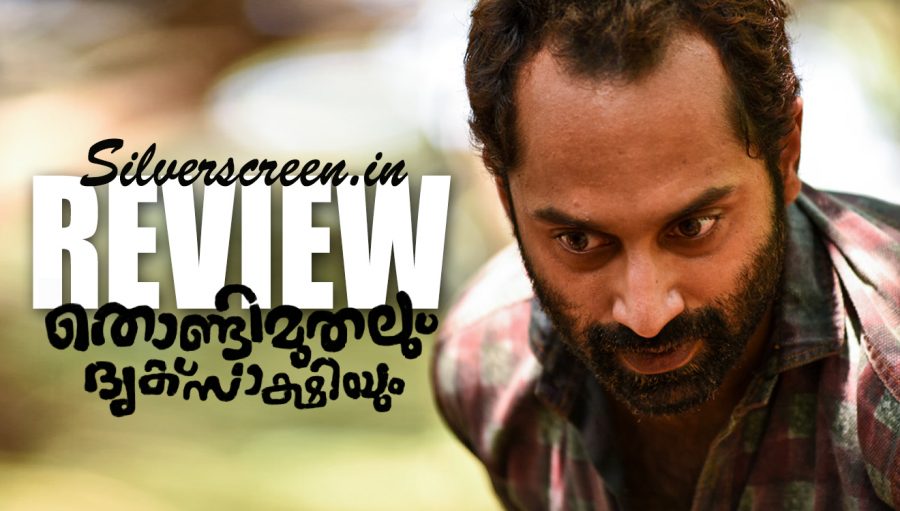Dileesh Pothan’s Thondimuthalum Driksakshiyum is an astute tale of a theft. A newly-wed woman is robbed of her wedding chain while she is travelling in a state transport bus through a new, unfamiliar region. She sees a pale young man stealing, and then swallowing the chain. Her husband, a meek villager, awkwardly requests the thief to return the chain, while fellow passengers enthusiastically surround the suspect, manhandle him, and take him to the local police station.
Unlike Pothan’s debut, Maheshinte Prathikaram, this isn’t a very buoyant film. Every character is deeply imperfect and emotionally vulnerable. Survival is their primal instinct. For that purpose, they lie, betray, implore and resort to violence.
Dileesh and his highly reliable cameraman, Rajeev Ravi, deftly capture the curious disorder of daily life, occasionally laughing at the pettiness of people and the situations they are caught in. For one, the police sub-inspector, who is a rough macho figure in front of his subordinates, criminals and civilians, quivers like a mouse when his boss makes an angry phone call. In another scene, the thief (Fahadh Fazil) coolly steals the name of the husband of the woman whose only jewellery he stole a while ago. The film makes you laugh, without pointing fingers at who you are laughing at. There are villagers who land at the police station with myriad complaints. They wait on the corridors, some times for days together, negotiate with each other, and keep life going. Pothan constructs the scenes inside the police station with forensic detailing. The subtlety with which he presents the wavering dynamics between the characters is great.
It is with the same subtlety that he paints a picture of the society where the story unfolds – divided by caste, class and numerous standards. Sreeja (Nimisha) and Prasad (Suraj), who are from two different castes, have to leave their native place, a green village on the lap of backwaters, and take shelter in an arid, colourless small-town many hundred miles away, to lead a normal life. The thief, although he says nothing of his past, has a similar story of social alienation to narrate. Many a time, he hints that he had a lonely, hungry and rough childhood.
There are no villains in this story, although you witness the whole episode of theft and the skewed police investigation that follows. There are no heroes too, just as there aren’t any spotlessly white heroic figures in real life. Dileesh knows the milieu of his characters too well. When Prasad spots Sreeja at a medical store, buying a pregnancy kit, he immediately assumes that it is his responsibility to inform her parents of what he saw. Interestingly, this tendency to be the moral guardian of a woman he hardly knows, doesn’t make him any inferior in the eyes of the film. He is a loyal social animal, whose life is intertwined with his surroundings. It is with similar fervour that a theology student and a purdah-clad young woman beat up the thief on the bus. The film’s sense of humour is multi-layered as you see in this scene.
Fahadh Fazil is terrific in the film, which has a brilliant cast. His careful and subtle performance is one of the best by an Indian actor in recent times. His unassuming body language hides his strikingly good facial features, and transforms him into this nameless, deceitful thief. You never realise what is going on inside his head. In the theft scene, we see his eyes first. He furtively scans the surroundings while skilfully moving his right hand towards the back of the neck of the lady passenger seated right in front of him. The scene is beautiful, with an exceptional artistic quality. Rajeev Ravi’s camera, like an invisible third man in the bus, quietly watches the thief and the hapless passenger. When the crowd surrounds the thief, he acts innocent. The camera keeps gazing at him, perhaps with a knowing smile.
Suraj delivers an excellent performance too. He is an actor with an inherent ability to disappear in a nondescript crowd. His portrayal of Prasad, a timid man with modest aspirations, is flawless – especially in the scene where he and Fahadh engage in a murky tussle: “I want my chain back,” he keeps chanting as if he is in a trance. It’s so finely enacted.
Debutante Nimisha Vijayan, who plays Sreeja, a fiery young woman who dares tell her own father that he is a selfish schmuck, is equally good.
There is also a bunch of over 25 real-life policemen in the film, who act like there is no camera watching them.
Bijibal’s music works magic in this film. Much like Rajeev Ravi’s camera, the musical element too, is an extension of the muddled thoughts flitting inside the characters’ mind. Bijibal is a quality addition to any film, for he knows the nuances that make great cinema.
Recommended
Thondimuthalum Driksakshiyum is by far, the best film in the ‘new generation wave’ of Malayalam cinema. It is intelligent, funny, and profoundly mysterious. With this film, Pothan easily joins the league of the finest contemporary filmmakers in the country. It is unfair to compare Pothan to the likes of KG George and Padmarajan, for his style of film-making is way different from that of the auteurs’. He is thoroughly grounded. There is also a touch of humanity in his films. Clearly, it is not literature or philosophy that moves him, but this humanity. For Fahadh Fazil, this is his finest performance yet, something that will be much-talked-about in the years to come as a great example of nuanced acting.
*****
The Thondimuthalum Driksakshiyum review is a Silverscreen original article. It was not paid for or commissioned by anyone associated with the movie. Silverscreen.in and its writers do not have any commercial relationship with movies that are reviewed on the site.



